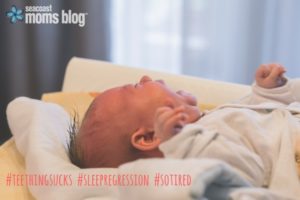If you have an infant or toddler, you’re more than likely to associate the term “infant sleep regression” with sleep. Second only to teething, regression is the default word parents use when seeking a reason for their child’s sleep problems. Instead, we tend to look for reasons behind our child’s behaviors. It’s easier to “guess” what is happening than to admit to feeling confused and out of control.
“Johnny has been teething for the past three months, so that’s why he has been waking every hour each night.”
 Teething is probably the most common go-to for parents when their children experience prolonged sleep disturbances. My Facebook news feed is often loaded with pictures of sleepy moms and grumpy baby faces, with hashtags like #teethingsucks, #whendoesteethingend, and #sotired.
Teething is probably the most common go-to for parents when their children experience prolonged sleep disturbances. My Facebook news feed is often loaded with pictures of sleepy moms and grumpy baby faces, with hashtags like #teethingsucks, #whendoesteethingend, and #sotired.
Here’s what you need to know about teething:
- During the first two years (or slightly more), your child will get 20 teeth.
- There is essentially an eight-day window during which teething happens (yes, only about a week per tooth).
- Finding after finding suggests that teething does not cause intense symptoms including, but not limited to: congestion, sleep disturbance, loose stools, increased stools, or fever over 102 degrees Fahrenheit.
“But my kid is very sensitive and I’m sure that teething disrupts her sleep.”
You are entitled to your beliefs but if your child has been experiencing sleep disturbances for more than a night or two, it’s probably due to something else (e.g. sleep props, a schedule that may not be age-appropriate, or cognitive/physical developments).
“Well if it’s not teething, then it must be a regression!”
re·gres·sion. rəˈɡreSH(ə)n/. noun. a return to a former or less developed state.
I posted this definition of regression so that you could understand why it makes me cringe. As a sleep consultant, I hear this word on a daily basis and I despise it. Why? It simply doesn’t really describe what is happening when your infant or toddler is having trouble sleeping.
In fact, when an infant or toddler is having trouble sleeping, say, at four-months-old, this is indicative of a matured sleep pattern, not a regressed sleep pattern. Prior to three or four months, your infant’s sleep patterns are erratic, as their circadian rhythms have not yet been established. When the so-called dreaded “Four-Month Sleep Regression” hits, your infant is actually growing and maturing. Your infant likely doesn’t know how to adjust to the breaks in her newly formed sleep cycles (hence the waking every 30 minutes or two hours). Similarly, when your 16-month-old begins taking short naps, has trouble falling asleep at night, or is experiencing early wake-ups, you may wonder if the dreaded “18-Month Regression” has arrived early. In actuality, this sleep disturbance likely has a whole lot to do with cognitive and physical developments—again, she’s not regressing, she’s progressing.
or toddler is having trouble sleeping, say, at four-months-old, this is indicative of a matured sleep pattern, not a regressed sleep pattern. Prior to three or four months, your infant’s sleep patterns are erratic, as their circadian rhythms have not yet been established. When the so-called dreaded “Four-Month Sleep Regression” hits, your infant is actually growing and maturing. Your infant likely doesn’t know how to adjust to the breaks in her newly formed sleep cycles (hence the waking every 30 minutes or two hours). Similarly, when your 16-month-old begins taking short naps, has trouble falling asleep at night, or is experiencing early wake-ups, you may wonder if the dreaded “18-Month Regression” has arrived early. In actuality, this sleep disturbance likely has a whole lot to do with cognitive and physical developments—again, she’s not regressing, she’s progressing.
Here’s what you need to know about baby sleep regressions:
- Be sure to eliminate any medical conditions if your child’s sleep suddenly changes in a drastic way. Ear infections are notoriously rough on sleep and often the only symptom is poor sleep.
- Consider the definition of “regression.” While frustrating, this sleep disturbance is likely connected to your child’s development—cognitive or physical.
- Some children are more sensitive than others to cognitive and physical developments, which can manifest in frequent sleep disturbances throughout the first two to three years.
- Sleep disturbances commonly occur when an infant or toddler is going through a cognitive “leap” OR when your child is mastering a new physical milestone. Crawling and walking tend to be the biggies related to physical developments!
- Remember that any changes in your life can also affect your child’s sleep–a new home, new daycare, new sibling. Understand that your child may need some extra attention during this time in order to help her feel secure.
How do I survive an infant sleep regression?
- Stay consistent with your child’s routine and schedule. I find that often when these periods of sleep disturbances occur, parents begin trying a whole slew of things to help their child sleep better. This often means changing up the schedule or routine several times. This is the LAST thing you want to do. Children thrive on routine and schedule–switching it up every few days in an effort to “fix” things will only make things more difficult in the long run!
- Make sure you have what you need. Whether your child is transitioning away from a swaddle or dropping a nap, some of these infant sleep must-haves can help a ton.
- Be patient. Understand that this “regression” is really a sign that your baby is growing and learning!
- Use your coping mechanisms. All of them. Wine, venting to friends or whatever it takes. Sleep deprivation can take a serious toll on your mental health and you need all the help you can get. You’ll get through it, promise.










